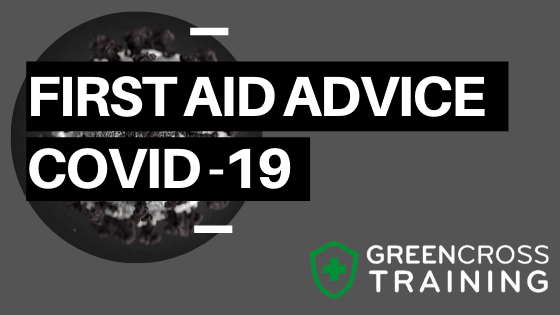Following enquiries regarding advice to currently trained first aiders we have taken recommendations from the Resuscitation council to help our community save lives whilst preventing the risk of infection. In all instances, first aid intervention is contingent upon the discretion of the first aider. However, we hope that this advice can guide first aiders in critical situations during this uncertain time.
Firstly, you are a priority. Therefore, if you are in danger, do not treat the patient and seek medical advice.
A common concern amongst first aiders is administering CPR during this pandemic. When CPR is performed, particularly on an unknown victim, there will always be some risk of cross infection. The Resuscitation Council states that normally the risk is small and is set against the inevitability of someone in cardiac arrest that will likely die with no intervention. Advice for first aiders is outlined below.
- Primarily, first responders should firstly shout for help and call 999.
- Recognise cardiac arrest by looking for the absence of signs of life and the absence of normal breathing. Do not listen or feel for breathing by placing your ear and cheek close to the patients mouth. If you are in any doubt about confirming cardiac arrest, the default position is to start chest compressions until help arrives.
- Make sure an ambulance is on its way. If COVID-19 is suspected, tell them when you call 999.
- If there is a perceived risk of infection, rescuers should attempt compression only CPR and early defibrillation until the ambulance (or advanced care team) arrives. Put hands together in the middle of the chest and push hard and fast.
- Early use of a defibrillator significantly increases the persons chances of survival and does not increase risk of infection.
- If the rescuer has access to personal protective equipment (PPE) (e.g. FFP3 face mask, disposable gloves, eye protection), these should be worn.
- After performing compression-only CPR, all rescuers should wash their hands thoroughly with soap and water; alcohol-based hand gel is a convenient alternative. They should also seek advice from the NHS 111 coronavirus advice service or medical adviser.
For any non-life threatening situations where there is perceived risk of infection, first aiders should stay 2 metres apart from the patient and seek help from emergency services. Using their first aid knowledge the first aider can direct the casualty to self administer first aid eg, apply direct pressure and self treat for shock.
Paediatric Guidelines
We are aware that paediatric cardiac arrest is unlikely to be caused by a cardiac problem and is more likely to be a respiratory one, making ventilations crucial to the childs chances of survival. The most important thing is to act quickly to ensure the child gets the treatment they need as quickly as possible.
For out-of-hospital cardiac arrest, the importance of calling an ambulance and taking immediate action cannot be stressed highly enough. If a child is not breathing normally and no actions are taken, their heart will stop and full cardiac arrest will occur.
It is likely that the child/infant having an out-of-hospital cardiac arrest will be known to you. We accept that doing rescue breaths will increase the risk of transmitting the COVID-19 virus, either to the rescuer or the child/infant. However, this risk is small compared to the risk of taking no action as this will result in certain cardiac arrest and the death of the child.
We hope this has helped any first aiders looking for guidance. Feel free to ask any questions by emailing coronavirus@greencrosstraining.co.uk
Stay safe.
Green Cross Training

